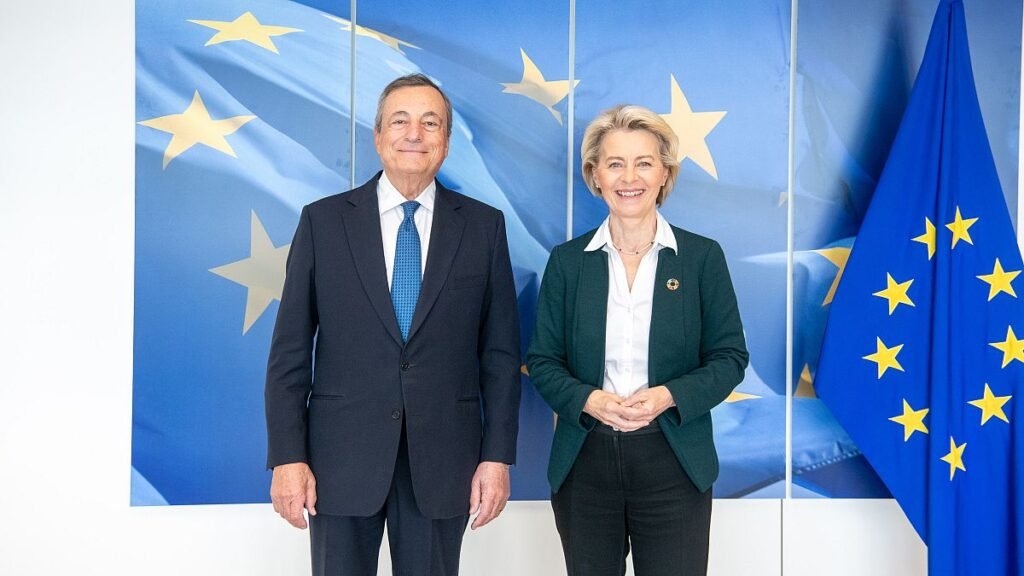Former Italian Prime Minister Mario Draghi is under scrutiny for his EU competitiveness report, which has been criticized for lacking diversity in consultation. The report received 236 contributions from various stakeholders, including prestigious institutions and companies, but some feel that voices from Central and Eastern Europe were not adequately represented. The EU Commission has defended Draghi, stating that as an independent advisor, he had the freedom to choose his consultation process. However, civil society organizations and NGOs have raised concerns that their perspectives were not reflected in the report, with only 5% of contributions coming from these groups. Some NGOs, such as the European Environmental Bureau, were listed as contributing stakeholders but claim they were not involved in the process.
Critics argue that the consultation process for Mario Draghi’s EU competitiveness report was one-sided, with voices from Central and Eastern Europe notably absent. While the report received inputs from various institutions and companies, civil society organizations and trade unions felt marginalized, with only 5% of contributions coming from these groups. NGOs, such as the European Environmental Bureau, were listed as contributing stakeholders but stated they were not actually involved in the process. The lack of diversity in the consultation process has raised concerns about the report’s ability to address pressing issues such as the ecological crisis and social inequality in Europe. Some stakeholders fear that the report may not adequately address these critical issues due to the narrow scope of voices involved in its development.
The EU Commission has defended Mario Draghi’s independence in choosing the consultation process for his EU competitiveness report, stating that he had the freedom to determine his working methods. Despite criticisms of a lack of diversity in the consultation process, Draghi’s team received contributions from a range of think tanks, universities, lobbyists, and businesses. However, concerns persist about the absence of voices from Central and Eastern Europe, as well as the limited representation of civil society organizations and NGOs. Stakeholders have expressed alarm that their perspectives were not adequately reflected in the 400-page report, which aims to provide recommendations on bridging Europe’s competitiveness gap with China and the US.
The controversy surrounding Mario Draghi’s EU competitiveness report highlights the need for greater inclusivity and diversity in the consultation process. Critics argue that the report’s narrow scope in terms of participants may hinder its ability to address crucial issues such as the ecological crisis and social inequality in Europe. While Draghi’s team received contributions from various stakeholders, including prestigious institutions and big tech companies, the absence of voices from Central and Eastern Europe has raised concerns about the report’s representativeness. Civil society organizations and NGOs have voiced alarm that their perspectives were not adequately considered in the report, with only a small percentage of contributions coming from these groups.
The lack of diversity in Mario Draghi’s EU competitiveness report has sparked criticism from stakeholders who feel marginalized by the consultation process. While Draghi’s team received inputs from a range of institutions and companies, civil society organizations and trade unions were significantly underrepresented in the report. Some NGOs, such as the European Environmental Bureau, claimed they were listed as contributing stakeholders but were not actually involved in the process. The absence of voices from Central and Eastern Europe has also been flagged as a concerning oversight, raising questions about the report’s ability to effectively address Europe’s competitiveness challenges. Stakeholders have called for greater inclusivity and diverse representation in future consultation processes to ensure a more comprehensive and balanced approach to policymaking in the EU.
In response to criticisms of Mario Draghi’s EU competitiveness report, the EU Commission has defended his independence in choosing the consultation process. While Draghi’s team received contributions from a variety of stakeholders, including prestigious institutions and big tech companies, concerns persist about the lack of diversity in the consultation process. Civil society organizations and NGOs have raised alarm that their perspectives were not adequately reflected in the report, with only a small percentage of contributions coming from these groups. The controversy surrounding the report underscores the importance of greater inclusivity and diversity in policymaking processes, particularly in addressing pressing issues such as the ecological crisis and social inequality in Europe. Moving forward, stakeholders are calling for more inclusive and representative consultation processes to ensure a comprehensive and balanced approach to policymaking in the EU.

